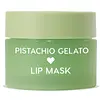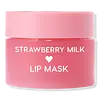What's inside
What's inside
 Key Ingredients
Key Ingredients

 Benefits
Benefits

 Concerns
Concerns

 Ingredients Side-by-side
Ingredients Side-by-side

Hydrogenated Polyisobutene
EmollientPolyisobutene
Diisostearyl Malate
EmollientTriethylhexanoin
MaskingCera Microcristallina
Emulsion StabilisingPolyglyceryl-2 Triisostearate
EmulsifyingBis-Diglyceryl Polyacyladipate-2
EmollientAroma
Hydrogenated Styrene/Isoprene Copolymer
Silica Dimethyl Silylate
EmollientParaffin
PerfumingEuphorbia Cerifera Wax
Bis-Behenyl/Isostearyl/Phytosteryl Dimer Dilinoleyl Dimer Dilinoleate
EmollientPhenoxyethanol
PreservativeSodium Saccharin
MaskingButyrospermum Parkii Butter
Skin ConditioningRubus Chamaemorus Seed Oil
Skin ConditioningRubus Idaeus Seed Oil
EmollientAscorbyl Palmitate
AntioxidantPentaerythrityl Tetra-Di-T-Butyl Hydroxyhydrocinnamate
AntioxidantTocopherol
AntioxidantAluminum Hydroxide
EmollientCI 42090
Cosmetic ColorantCI 47005
Cosmetic ColorantCI 77947
CI 77891
Cosmetic ColorantHydrogenated Polyisobutene, Polyisobutene, Diisostearyl Malate, Triethylhexanoin, Cera Microcristallina, Polyglyceryl-2 Triisostearate, Bis-Diglyceryl Polyacyladipate-2, Aroma, Hydrogenated Styrene/Isoprene Copolymer, Silica Dimethyl Silylate, Paraffin, Euphorbia Cerifera Wax, Bis-Behenyl/Isostearyl/Phytosteryl Dimer Dilinoleyl Dimer Dilinoleate, Phenoxyethanol, Sodium Saccharin, Butyrospermum Parkii Butter, Rubus Chamaemorus Seed Oil, Rubus Idaeus Seed Oil, Ascorbyl Palmitate, Pentaerythrityl Tetra-Di-T-Butyl Hydroxyhydrocinnamate, Tocopherol, Aluminum Hydroxide, CI 42090, CI 47005, CI 77947, CI 77891
Hydrogenated Polyisobutene
EmollientPolyisobutene
Diisostearyl Malate
EmollientTriethylhexanoin
MaskingCera Microcristallina
Emulsion StabilisingPolyglyceryl-2 Triisostearate
EmulsifyingBis-Diglyceryl Polyacyladipate-2
EmollientHydrogenated Styrene/Isoprene Copolymer
Aroma
Silica Dimethyl Silylate
EmollientParaffin
PerfumingEuphorbia Cerifera Wax
Bis-Behenyl/Isostearyl/Phytosteryl Dimer Dilinoleyl Dimer Dilinoleate
EmollientPhenoxyethanol
PreservativeSodium Saccharin
MaskingButyrospermum Parkii Butter
Skin ConditioningRubus Chamaemorus Seed Oil
Skin ConditioningRubus Idaeus Seed Oil
EmollientAscorbyl Palmitate
AntioxidantPentaerythrityl Tetra-Di-T-Butyl Hydroxyhydrocinnamate
AntioxidantTocopherol
AntioxidantCI 42090
Cosmetic ColorantCI 45410
Cosmetic ColorantCI 19140
Cosmetic ColorantCI 15850
Cosmetic ColorantHydrogenated Polyisobutene, Polyisobutene, Diisostearyl Malate, Triethylhexanoin, Cera Microcristallina, Polyglyceryl-2 Triisostearate, Bis-Diglyceryl Polyacyladipate-2, Hydrogenated Styrene/Isoprene Copolymer, Aroma, Silica Dimethyl Silylate, Paraffin, Euphorbia Cerifera Wax, Bis-Behenyl/Isostearyl/Phytosteryl Dimer Dilinoleyl Dimer Dilinoleate, Phenoxyethanol, Sodium Saccharin, Butyrospermum Parkii Butter, Rubus Chamaemorus Seed Oil, Rubus Idaeus Seed Oil, Ascorbyl Palmitate, Pentaerythrityl Tetra-Di-T-Butyl Hydroxyhydrocinnamate, Tocopherol, CI 42090, CI 45410, CI 19140, CI 15850
Ingredients Explained
These ingredients are found in both products.
Ingredients higher up in an ingredient list are typically present in a larger amount.
Aroma refers to an ingredient, or mixture of ingredients, that impart or mask a flavor.
The name is slightly confusing. This is because INCI associates aroma with flavor instead of smell.
Here is the official definition from the The International Cosmetic Ingredient Dictionary and Handbook:
“Aroma is a term for ingredient labeling used to identify that a product contains a material or combination of materials normally added to a cosmetic to produce or to mask a particular flavor.”
INCI shows the only purpose of aroma to be "flavouring".
However, due to regulation differences, some companies may use aroma in place of parfum.
In Canada, this ingredient only has to be listed in concentrations above 1%.
Learn more about AromaAscorbyl Palmitate is created by combining pure Vitamin C and palmitic acid. It is an antioxidant and helps reduce hyperpigmentation.
This ingredient is a more stable version of Vitamin C, meaning it does not disintegrate as quickly when exposed to sunlight. However, studies show it does not penetrate skin as well as pure Vitamin C.
Ascorbyl Palmitate is oil soluble.
Read more about other types of Vitamin C:
Learn more about Ascorbyl PalmitateWe don't have a description for Bis-Behenyl/Isostearyl/Phytosteryl Dimer Dilinoleyl Dimer Dilinoleate yet.
This ingredient is lipid-based synthetic skin-conditioning agent derived from adipic acid and a mixture of fatty acids. It is often called a lanolin substitute.
As an emollient, it helps soften and hydrate the skin. Emollients create a barrier on the skin to trap moisture in.
Due to its fatty acid base, it may not be Malassezia folliculitis safe.
Learn more about Bis-Diglyceryl Polyacyladipate-2This ingredient is also known as shea butter. It is an effective skin hydrator and emollient.
Emollients help soothe and soften your skin. It does this by creating a protective film on your skin. This barrier helps trap moisture and keeps your skin hydrated. Emollients may be effective at treating dry or itchy skin.
Shea butter is rich in antioxidants. Antioxidants help fight free-radicals, or molecules that may harm the body. It is also full of fatty acids including stearic acid and linoleic acid. These acids help replenish the skin and keep skin moisturized.
While Shea Butter has an SPF rating of about 3-4, it is not a sunscreen replacement.
Shea butter may not be fungal acne safe. We recommend speaking with a professional if you have any concerns.
Learn more about Butyrospermum Parkii ButterCera Microcristallina isn't fungal acne safe.
Ci 42090 is a synthetic dye created from petroleum. It is used to give a bright blue color to cosmetics, medicine, and food.
Diisostearyl Malate is an emollient and most often used in lip products. It comes from isostearyl alcohol, a fatty acid, and malic acid, an AHA.
As an emollient, Diisostearyl Malate helps create a thin film on your skin to trap moisture in. This helps keep your skin soft and smooth.
Hydrogenated Polyisobutene is a synthetic polymer. Polymers are compounds with high molecular weight. Hydrogenated Polyisobutene is an emollient and texture enhancer.
In one study, Hydrogenated Polyisobutene showed better skin hydration levels than Caprylic/Capric Triglyceride. As an emollient, it helps keep your skin soft and hydrated by trapping moisture in.
Hydrogenated Polyisobutene is often used as a mineral oil replacement.
Learn more about Hydrogenated PolyisobuteneWe don't have a description for Hydrogenated Styrene/Isoprene Copolymer yet.
Paraffin is a solid created from petroleum. The term 'paraffin' can also refer to either
petroleum jelly or mineral oil.
It has natural occlusive properties which can worsen oily skin. Due to its petrolatum base, this ingredient is not fungal-acne safe.
Pentaerythrityl Tetra-Di-T-Butyl Hydroxyhydrocinnamate (long name, huh?) is a synthetic antioxidant.
It is used to help stabilize other antioxidants or prevent the color from changing in a product.
As an antioxidant, it helps fight free-radical molecules. Free-radical molecules are capable of damaging our cells and other genetic material. Thus, antioxidants may reduce the signs of aging.
This ingredient is oil-soluble.
Learn more about Pentaerythrityl Tetra-Di-T-Butyl HydroxyhydrocinnamatePhenoxyethanol is a preservative that has germicide, antimicrobial, and aromatic properties. Studies show that phenoxyethanol can prevent microbial growth. By itself, it has a scent that is similar to that of a rose.
It's often used in formulations along with Caprylyl Glycol to preserve the shelf life of products.
This ingredient is a form of glycerin with emulsifying and emollient properties.
As an emulsifier, this ingredient helps keep products together while adding a thick texture. The manufacturer states this ingredient has emollient properties. Emollients help keep the skin hydrated by trapping moisture in.
Polyglyceryl-2 Triisostearate is created by reacting diglycerin and isostearic acid. Due to the isostearic acid base, it may not be safe for Malassezia or fungal acne.
Learn more about Polyglyceryl-2 TriisostearatePolyisobutene is a synthetic polymer made from isobutene.
It is a film-forming agent and helps bind ingredients together.
Polyisobutene is not absorbed by the skin.
Learn more about PolyisobuteneCloudberry seed oil is rich in vitamin C, citric acid, malic acid, vitamin C, and beta-carotene.
Rubus Idaeus Seed Oil is created from the seeds of the raspberry fruit. Raspberries are native to northern Europe and Asia.
Raspberry seed oil is an emollient with antioxidant and anti-inflammatory properties. It is rich in fatty acids, tocopherols, flavonoids, Vitamin C, and Vitamin E.
As an emollient, raspberry seed oil helps hydrate your skin. Emollients prevent moisture from evaporating by creating a film on top.
Learn more about Rubus Idaeus Seed OilThis silica is mainly used to thicken oils and suspend particles in oils. It is not water soluble.
According to the manufacturer, it:
The manufacturer also claims this ingredient to be useful in makeup.
In lipstick formulations, this ingredient improves color payoff, reduces pigment settling, and reduces oil bleeding. This ingredient also improves the grip of powder products such as dry shampoos.
Learn more about Silica Dimethyl SilylateWe don't have a description for Sodium Saccharin yet.
Tocopherol (also known as Vitamin E) is a common antioxidant used to help protect the skin from free-radicals and strengthen the skin barrier. It's also fat soluble - this means our skin is great at absorbing it.
Vitamin E also helps keep your natural skin lipids healthy. Your lipid skin barrier naturally consists of lipids, ceramides, and fatty acids. Vitamin E offers extra protection for your skin’s lipid barrier, keeping your skin healthy and nourished.
Another benefit is a bit of UV protection. Vitamin E helps reduce the damage caused by UVB rays. (It should not replace your sunscreen). Combining it with Vitamin C can decrease sunburned cells and hyperpigmentation after UV exposure.
You might have noticed Vitamin E + C often paired together. This is because it is great at stabilizing Vitamin C. Using the two together helps increase the effectiveness of both ingredients.
There are often claims that Vitamin E can reduce/prevent scarring, but these claims haven't been confirmed by scientific research.
Learn more about TocopherolTriethylhexanoin is created from glycerin and 2-ethylhexanoic acid. It is a solvent and emollient.
As a solvent, Triethylhexanoin helps dissolve ingredients to stable bases or help evenly distribute ingredients throughout the product.
It is also an emollient and helps condition the skin.
Learn more about TriethylhexanoinEuphorbia Cerifera wax comes from a shrub in Northern Mexico. It is used to stabilize formulations and has emollient properties.
Emollients form a thin layer on top of skin to prevent water from evaporating, keeping skin and lips hydrated.
According to a manufacturer, this wax can range from a yellow/brown color to translucent.
Learn more about Euphorbia Cerifera Wax